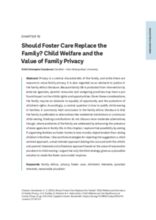This is chapter 10 in the book "Child Welfare and the Value of Family Privacy".
Abstract:
Privacy is a central characteristic of the family, and while there are reasons to value family privacy, it is also regarded as an obstacle to justice in the family ethics literature. Because family life is protected from intervention by external agencies, parents’ resources and caregiving practices may have a profound impact on the child’s rights and opportunities. Given these considerations, the family may be an obstacle to equality of opportunity and the protection of children’s rights. Accordingly, a central question is how to justify child-rearing in families. A commonly held conclusion in the family ethics literature is that the family is preferable to alternatives like residential institutions or communal child-rearing. Existing contributions do not discuss more moderate alternatives, though, where problems of the family are addressed by enhancing the presence of state agencies in family life.
In this chapter, the author explores that possibility by asking if organising families as foster homes is less morally objectionable than raising children in families. The author discusses three strategies for rejecting the suggestion: a childcentred approach, a dual-interest approach (taking into account both the child’s and parents’ interests) and a Rawlsian approach based on the value of reasonable pluralism in child-rearing. The author argues that only the third strategy gives us a plausible solution to resist the foster care model they explore.

